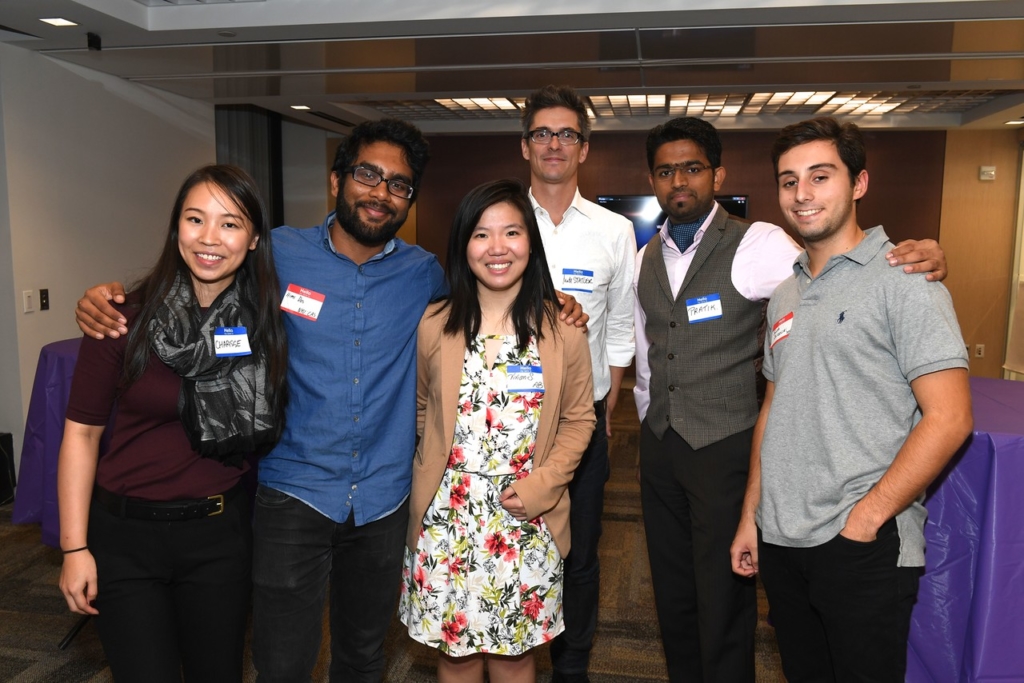
NYU Stern undergraduate college students at the 2016 Social Impact Student Alumni Mingle with Matt Statler, Richman Family Director of Business Ethics and Social Impact Programming for Stern’s Undergraduate College. Courtesy photo
As for providing their students with global immersions and signature experiences, no school does it better than New York University’s Stern School of Business, according to the Class of 2015. We asked the following yes or no questions: “Were you engaged in a “signature experience” (project work, simulations, experiential learning, senior thesis) through the business program that was a key part of your business learning?” and “Were you engaged in a global immersion, trip, or project of any kind through the business program?” Some 74.44% answered “yes” to the former and an amazing 97.78% said “yes” to the latter, for an overall average of 86.11%, higher than any other school.
The Hult International Business School had the second-highest average at 82.14%. They were followed by the University of Minnesota’s Carlson School of Management (78.29%), Worcester Polytechnic Institute (75%), and the University of North Carolina’s Kenan-Flagler Business School (71.82%). Only 19 schools had an average of 50% or higher.
At NYU Stern, the global immersion experience is fivefold. First is New York University’s massive global footprint. The university has campuses at 14 global locations, including the New York City home campus. Second, students can participate in the International Business Exchange program (IBEX) with one of Stern’s 18 partner universities around the world. Next, Stern offers short global immersions at campuses in India, Abu Dhabi, and Ghana. Fourth is the International Studies Program, which launched in 2001. Every junior at Stern takes a course in the spring centered around global commerce. In groups of 200 or so, the students travel to different continents to put what they learn in the classroom to the test. “I think other schools have tried to imitate this program, but fail,” NYU Stern Dean of the Undergraduate Program, Geeta Menon says. “Can you imagine the logistical nightmares?” Lastly, 50 high performing high school students are admitted into the Business and Political Economy program. The entire sophomore year is spent abroad — the first semester in London and second semester in Shanghai.
“Right from the get-go, people come in knowing fully well that global is a big part of what we do. And they start thinking about it from the freshman year,” Menon says.
‘YOU HAVE TO LEARN HOW TO PROBLEM SOLVE’
Within the qualitative portion of the alumni survey, members of the Class of 2015 continuously gush about the International Studies Program.
“I took the International Studies Program my junior year where I learned about a beverage company in Ho Chi Minh, and then during spring break, we went to the actual company and we were able to see the business firsthand and ask questions directly to the family that ran the business,” one Stern 2015 graduate said. “This program really helped me understand some of the inner workings of international business that I would not have seen just in a classroom. While on the trip, we also went to three different retail stores in the city at three different economic thresholds to try and understand the juxtaposition of the tourist industry and every day life. This was also very valuable to see the stark difference in what is created for tourists and the standard of life for a local citizen.”
Seeing how locals live is one of the major goals of all trips for students, Menon says.
“One of the things we’re really against is being a tourist,” Menon explains. “That’s not what it’s about. It’s about education. We take the coursework really seriously.”
As for the value of early international travel, Menon says it creates confidence and self-awareness in students.
“It creates independence,” Menon continues. “If you don’t have it, you’re going to develop it. You have to learn how to problem solve.”










